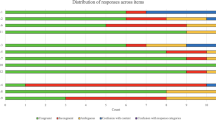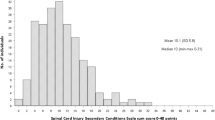Abstract
Objective:
Spinal Cord Lesion-Related Coping Strategies Questionnaire (SCL CSQ) is a specific test that is developed for evaluating the coping strategies of the persons with spinal cord injury (SCI). The aim of this study was to evaluate the reliability and validity of the Turkish version of SCL CSQ (SCL CSQ-T) in persons with SCI.
Methods:
One hundred persons with SCI were included in the study. All participants were evaluated with SCL CSQ-T and Brief Coping Styles Inventory (BCSI) at the baseline. SCL CSQ-T was repeated twice in 15 days. American Spinal Injury Association Impairment Scale and Functional Independence Measurement were used for the evaluation of the neurological loss severity and functional status. Emotional status was assessed by Hospital Anxiety and Depression Scale (HADS). Internal consistency reliability, test-retest reliability and construct validity of SCL CSQ-T were evaluated.
Results:
Intraclass correlation coefficients of the SCL CSQ-T were between 0.51–0.86. Cronbach’s alpha values and test-retest reliability of the acceptance, fighting spirit and social reliance subscales were good. Three factors were found in exploratory factor analysis. There was a positive correlation between the subscales of SCL CSQ-T. There was a statistically significant positive correlation between acceptance strategy of SCL CSQ-T and self-confidence and optimism of BCSI. The fighting spirit strategy positively correlated with self-confidence and optimistic strategies. The social reliance strategy positively correlated with helplessness and seeking social support. Coping strategies did not correlate with HADS.
Conclusion:
The results of this study revealed good internal consistency reliability, test-retest reliability and concurrent validity of the SCL CSQ-T factors acceptance and fighting spirit in relation to general coping strategies. The coping strategy social reliance needs revisions.
Similar content being viewed by others
Log in or create a free account to read this content
Gain free access to this article, as well as selected content from this journal and more on nature.com
or
References
Folkman S, Lazarus RS . An analysis of coping in a middle-aged community sample. J Health Soc Behav 1980; 21: 219–239.
Hanson S, Buckelew SP, Hewett J, O’Neal G . The relationship between coping and adjustment after spinal cord injury: a 5 year follow-up study. Rehab Psychol 1993; 38: 41–52.
Carver CS, Scheier MF, Winetraub JK . Assessing coping strategies: a theoretically based approach. J Pers Soc Psychol 1989; 56: 267–283.
Endler NS, Parker JD . Multidimensional assessment of coping: a critical evaluation. J Pers Soc Psychol 1990; 58: 844–854.
Elfström ML, Kreuter M, Persson L-O, Sullivan M . General and condition specific measures of coping strategies in persons with spinal cord lesion. Psychol Health Med 2005; 10: 231–242.
Carver CS . You want to measure coping but your protocol’s too long: consider the brief COPE. Int J Behav Med 1997; 4: 92–100.
Sahin N, Durak A . A brief coping styles inventory for university students. Türk Psikol Derg 1995; 10: 56–73.
Paker N, Bugdayci D, Dere D, Altuncu Y . Comparison of the coping strategies, anxiety and depression in a group of Turkish spinal cord injured patients and their family caregivers in a rehabilitation center. Eur J Phys Rehabil Med 2011; 47: 595–600.
Elfström ML, Ryden A, Kreuter M, Persson L-O, Sullivan M . Linkages between coping and psychological outcome in the spinal cord lesioned: development of SCL-related measures. Spinal Cord 2002; 40: 23–29.
Ware JE, Keller SD, Gandek B, Brazier JE, Sullivan M . Evaluating translations of health status questionnaires: methods from the IQOLA project. Int J Technol Assess Health Care 1995; 11: 525–551.
Kennedy P, Lude P, Taylor N . Quality of life, social participation, appraisals and coping post spinal cord injury: a review of four community samples. Spinal Cord 2006; 44: 95–105.
Kennedy P, Lude P, Elfström ML, Smithson E . Cognitive appraisals, coping and quality of life outcomes: a multi-centre study of spinal cord injury rehabilitation. Spinal Cord 2010; 48: 762–769.
Aydemir Ö . Validity and reliability of Turkish version of Hospital Anxiety and Depression Scale. Turk Psikiyatr Derg 1997; 8: 280–287.
Zigmond AS, Snaith RP . The hospital anxiety and depression scale. Acta Psychiatr Scand 1983; 67: 361–370.
Elfström ML, Kreuter M, Ryden A, Persson L-O, Sullivan M . Effects of coping on psychological outcome when controlling for background variables: a study of traumatically spinal cord lesioned persons. Spinal Cord 2002; 40: 408–415.
Elfström ML, Kennedy P, Lude P, Taylor N . Condition-related coping strategies in persons with spinal cord lesion: a cross-national validation of the Spinal Cord Lesion-related Coping Strategies Questionnaire in four community samples. Spinal Cord 2007; 45: 420–428.
Fleiss JL . The Design and Analysis of Clinical Experiment. John Wiley & Sons Inc.: New York. 1986; 1: 1–32.
Migliorini CE, Elfström ML, Tonge BJ . Translation and Australian validation of the spinal cord lesion-related coping strategies and emotional wellbeing questionnaires. Spinal Cord 2008; 46: 690–695.
Kennedy P, Marsh N, Lowe R, Grey N, Short E, Rogers B . A longitudinal analysis of psychological impact and coping strategies following spinal cord injury. Br J Health Psychol 2000; 5: 157–172.
Elfström ML, Kreuter M . Relationships between locus of control, coping strategies and emotional well-being in persons with spinal cord lesion. J Clin Psychol Med Settings 2006; 13: 89–100.
Kennedy P, Lude P, Elfström ML, Smithson EF . Psychological contributions to functional independence: a longitudinal investigation of spinal cord injury rehabilitation. Arch Phys Med Rehabil 2011; 92: 597–602.
Author information
Authors and Affiliations
Corresponding author
Ethics declarations
Competing interests
The authors declare no conflict of interest.
APPENDIXSCL CSQ Turkish v 1.0
APPENDIXSCL CSQ Turkish v 1.0
1. Yaralanmamı hayattaki başka olaylarla kıyaslamayı başarabiliyorum (A)
2. Yaralanmamdan sonra hayatta daha önce düşünmediğim şeylere değer vermeyi öğrendim (A)
3. Bana göre başarmak için uğruna mücadele edebileceğim hedefler koymak önemlidir (FS)
4. Diğer insanların bana yardım edebileceğine inanırım (A)
5. Yaşamımda yaralanmaya rağmen elimden gelenin en iyisini yapmaya çalışırım (FS)
6. Fiziksel olarak kaybettiklerimi, diğer birçok başka yolla tekrar kazanıyorum (A)
7. Yaralanmanın hayatımı kontrol etmesini reddediyorum (FS)
8. İnsanlar bana destek olmasa kendimi tamamen çaresiz hissederdim (SR)
9. Yaralanmamdan sonra birçok konuda diğer kişilere bağımlı olduğumu anladım (SR)
10. Kendimi her zaman idare etmeye çalışırım (FS)
11. Sanırım yaralanmamı kabullendim (A)
12. Her zaman hayatı kolaylaştırmak için yeni yollar ararım (FS)
Rights and permissions
About this article
Cite this article
Paker, N., Bugdayci, D., Kesiktas, N. et al. Reliability and validity of the Turkish version of spinal cord lesion-related coping strategies. Spinal Cord 52, 383–387 (2014). https://doi.org/10.1038/sc.2013.142
Received:
Revised:
Accepted:
Published:
Issue date:
DOI: https://doi.org/10.1038/sc.2013.142
Keywords
This article is cited by
-
Does the Danish version of the Spinal Cord Lesion-related Coping Strategies Questionnaire measure what we think it measures? A triangulated mixed-methods validation approach
Spinal Cord (2022)
-
The associations of acceptance with quality of life and mental health following spinal cord injury: a systematic review
Spinal Cord (2020)



